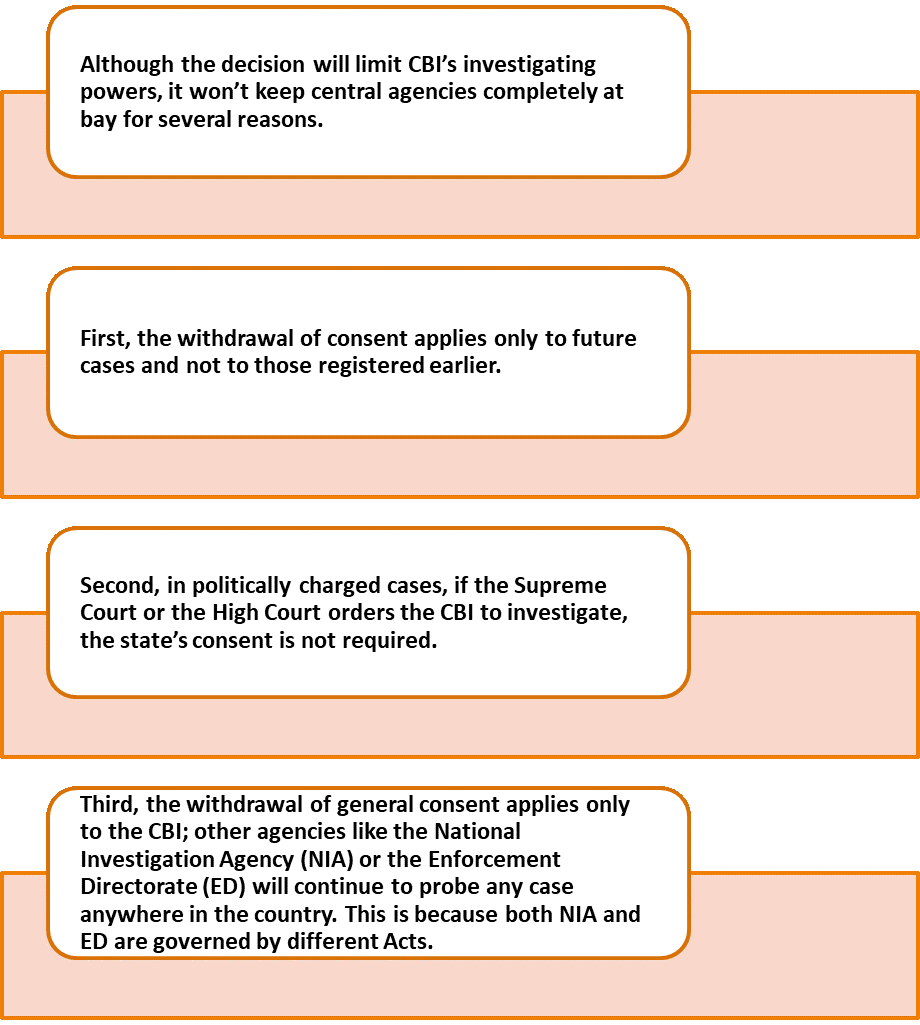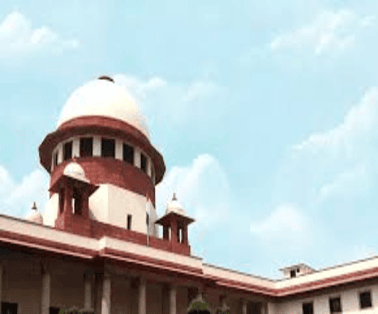The Tamil Nadu government recently withdrawn the CBI general consent given to the Central Bureau of Investigation (CBI) to investigate the cases in the state without prior permission from it.
Key Points
- The Tamil Nadu government has joined nine other states in India that has withdrawn their consent to investigation by the Central Bureau of Investigation (CBI)
- The move by Tamil Nadu Government comes hours after the Enforcement Directorate (ED) arrested Tamil Nadu electricity minister and DMK leader V Senthil Balaji in money laundering case.
- The withdrawal of consent by the Tamil Nadu government means that for any investigation, the CBI will now have to secure permission from the state.
- The other nine states which had withdrawn their general consent to CBI to probe cases include Chhattisgarh, Jharkhand, Kerala, Meghalaya, Mizoram, Punjab, Rajasthan, Telangana and West Bengal.
- Therefore Tamil Nadu became the tenth Indian state to withdraw its general consent for investigations by the CBI.
Consent of States
- The CBI is governed by the Delhi Special Police Establishment (DSPE) Act, 1946.
- Section 6 of the DSPE Act states that no member of the Special Police Establishment shall be allowed to exercise the powers and jurisdiction afforded them by the Act without the consent of the concerned state government.
- States typically give consent to assist the CBI in conducting a seamless investigation involving central government personnel in their states.
- This is consent by default otherwise CBI would have to seek permission from the state government in every case, even for small tasks.
General Consent For CBI
- Consent given by a state government to the CBI can come in two forms, either case-specific, or ‘general’.
- General consent, as the name indicates, allows the CBI to operate seamlessly within states.
- When a state gives a general consent to the CBI for probing a case, the agency is not required to seek fresh permission every time it enters that state in connection with investigation or for every case.
- Withdrawal of general consent also means that the CBI will not be able to register any fresh case involving central government officials or private persons in a particular state without prior permission of that state government.
- The CBI can continue to investigate cases in a state registered prior to the withdrawal of general consent.
- In contrast, if the CBI does not have the general consent of a state government, it is required to apply for consent on a case-by-case basis and cannot act before the consent is given.
- If specific consent is not granted, the CBI officials will not have the power of police personnel when they enter that state.

Central Agencies

What Types Of Cases The CBI Investigates In A State?
- The CBI investigates three types of cases through three specialised wings. The Anti-Corruption Divisionthat probes cases of corruption against public servants.
- The Economic Offences Divisionprobes crimes of financial malfeasance, bank frauds, money laundering, black money operations, and the like. However, the CBI usually transfers cases of money laundering to the Enforcement Directorate (ED).
- There is a Special Crimes Divisionto investigate cases of violence such as murder, crimes related to internal security such as espionage, narcotics and banned substances, and cheating.
Consent Withdrawal
- Since the BJP came to power in the Union government in 2014, ten states have withdrawn general consent to the CBI.
- The first of these was Mizoram in 2015, then under Congress chief minister Lal Thanhawla.
- The other nine states which had withdrawn their general consent to the CBI to probe cases include Chhattisgarh, Jharkhand, Kerala, Meghalaya, Mizoram, Punjab, Rajasthan, Telangana and West Bengal.
- In March, 2022, Meghalaya became the ninth state to have withdrawn consent to the CBI
- In 2018, N. Chandrababu Naidu’s Telugu Desam Party (TDP)-led Andhra Pradesh government withdrew consent.
- However, after Y.S. Jagan Mohan Reddy’s YSR Congress Party took charge of Andhra Pradesh in 2019, CBI consent was restored.
Central Bureau of Investigation (CBI)

To Download Monthly Current Affairs PDF Click here
Click here to get a free demo
Everything About CLAT 2025
Frequently Asked Questions
Section 6 of the DSPE Act states that no member of the Special Police Establishment shall be allowed to exercise the powers and jurisdiction afforded them by the Act without the consent of the concerned state government
Which states has withdrawn general consent to the CBI?
Punjab, Mizoram and Meghalaya have withdrawn their general consent to the CBI.
The Central Bureau of Investigation comes under which Ministry??
The Central Bureau of Investigation comes under Ministry of Personnel and Training
Which committee recommended to establish the Central Bureau of Investigation?
Santhanam Committee recommended to establish the Central Bureau of Investigation
In which Year was CBI set up??
The CBI was set up in 1963 by a resolution of the Ministry of Home Affairs



